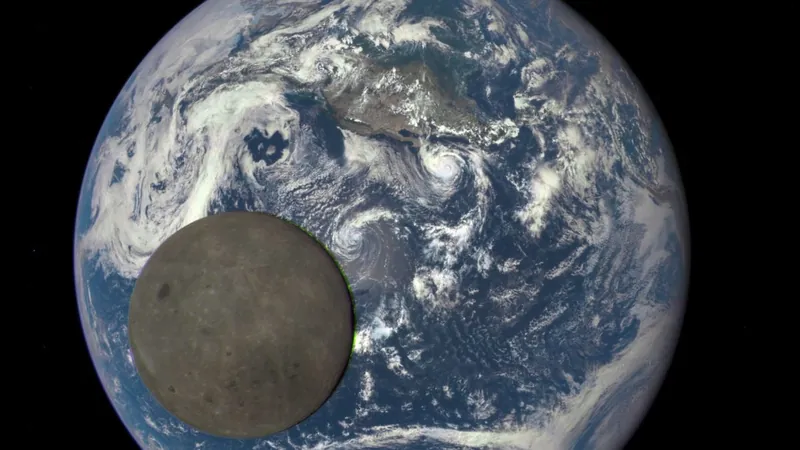
The Clock is Ticking: Satellite Data Reveals Urgent Reality of Climate Change – But Why Aren’t We Acting?
2024-10-10
Author: Yu
As humanity gazes into the cosmos, our very own planet is undergoing dramatic changes that cannot be ignored. While space exploration captures our collective imagination with images of otherworldly phenomena, agencies like NASA and the European Space Agency (ESA) are diligently monitoring a crisis unfolding right here on Earth. Their satellite technology is unveiling disturbing realities about climate change—tracking the emission of greenhouse gases, deforestation, and the alarming melting of polar ice caps.
Since the launch of the U.S. Geological Survey's Landsat Earth Observation satellites in 1972, we have gained access to crucial data detailing how human activities are eroding the health of our planet. With these observations, scientists have confirmed that human actions are the leading contributors to climate change. The harsh reality? Earth is in peril—biodiverse habitats are disappearing, oceans are increasingly polluted, and ice sheets are vanishing at an unprecedented rate.
Yet, despite the wealth of data showcasing the catastrophic trajectory we are on, a pressing question looms: Why hasn’t this knowledge spurred the large-scale environmental action that is urgently needed?
Inès Otosaka, Director for Operations of the NERC Centre for Polar Observation and Modeling (CPOM), highlights the power of satellites in monitoring Greenland and Antarctica’s ice sheets. “We can track ice loss through volume changes, ice flow, and even gravitational pull—something only satellite data can effectively achieve,” she explains. The capacity to observe these alarming changes in real-time marks a significant leap in our understanding of Earth's climate dynamics.
However, the wealth of information can feel frustratingly stagnant. As suggested by Karen Jones, Senior Policy Analyst at the Center for Space Policy, we need a radical shift towards increased accountability among all stakeholders. Jones advocates for a comprehensive integrated Earth observation system that brings together data from satellites and ground-based sensors to pinpoint exact sources of greenhouse gas emissions like methane from livestock and leaks from fracking operations.
The key to transforming this data into actionable change lies in collaboration. Bridging gaps between the space industry, policymakers, landowners, and civil organizations is critical. Open-source data initiatives can inspire transparency, foster cooperation, and empower various groups—from activists to academic researchers—to hold polluters accountable. A noteworthy example of this collaboration is SkyTruth, a nonprofit that utilizes satellite imagery to assist Global Fishing Watch in combating illegal fishing.
But corporate climate responsibility is equally crucial. While we know Arctic sea ice is thinning—crucial for regulating global temperatures—a UK startup named Real Ice has pursued an innovative strategy to combat this crisis. By spraying seawater atop melting ice, they aim to create thicker, more resilient layers capable of surviving the summer sun.
The intricacies of economics compound the problem. Major sectors—energy, transportation, and agriculture—cling to fossil fuels, hindering the transition to renewable energy. To accelerate this shift, we need more than environmental awareness—we need robust political action that transcends the whims of party politics. As Otosaka points out, “The political timeline often clashes with our climate ambitions.” Communicating data effectively to the public and policymakers can foster the impetus for urgent action.
If we don't integrate our global economy with environmental integrity, motivation for action among individuals may remain elusive until climate crises hit home. As we move towards a future expecting a dramatic 50% increase in global energy demand by 2050, we face a daunting challenge in meeting the COP26 climate agreements of reaching net-zero emissions.
The ultimate question remains: How will we power the future of our planet sustainably? As World Space Week 2024 reminds us, understanding our dynamic global environment is key to safeguarding it for future generations—before it’s too late.


 Brasil (PT)
Brasil (PT)
 Canada (EN)
Canada (EN)
 Chile (ES)
Chile (ES)
 España (ES)
España (ES)
 France (FR)
France (FR)
 Hong Kong (EN)
Hong Kong (EN)
 Italia (IT)
Italia (IT)
 日本 (JA)
日本 (JA)
 Magyarország (HU)
Magyarország (HU)
 Norge (NO)
Norge (NO)
 Polska (PL)
Polska (PL)
 Schweiz (DE)
Schweiz (DE)
 Singapore (EN)
Singapore (EN)
 Sverige (SV)
Sverige (SV)
 Suomi (FI)
Suomi (FI)
 Türkiye (TR)
Türkiye (TR)